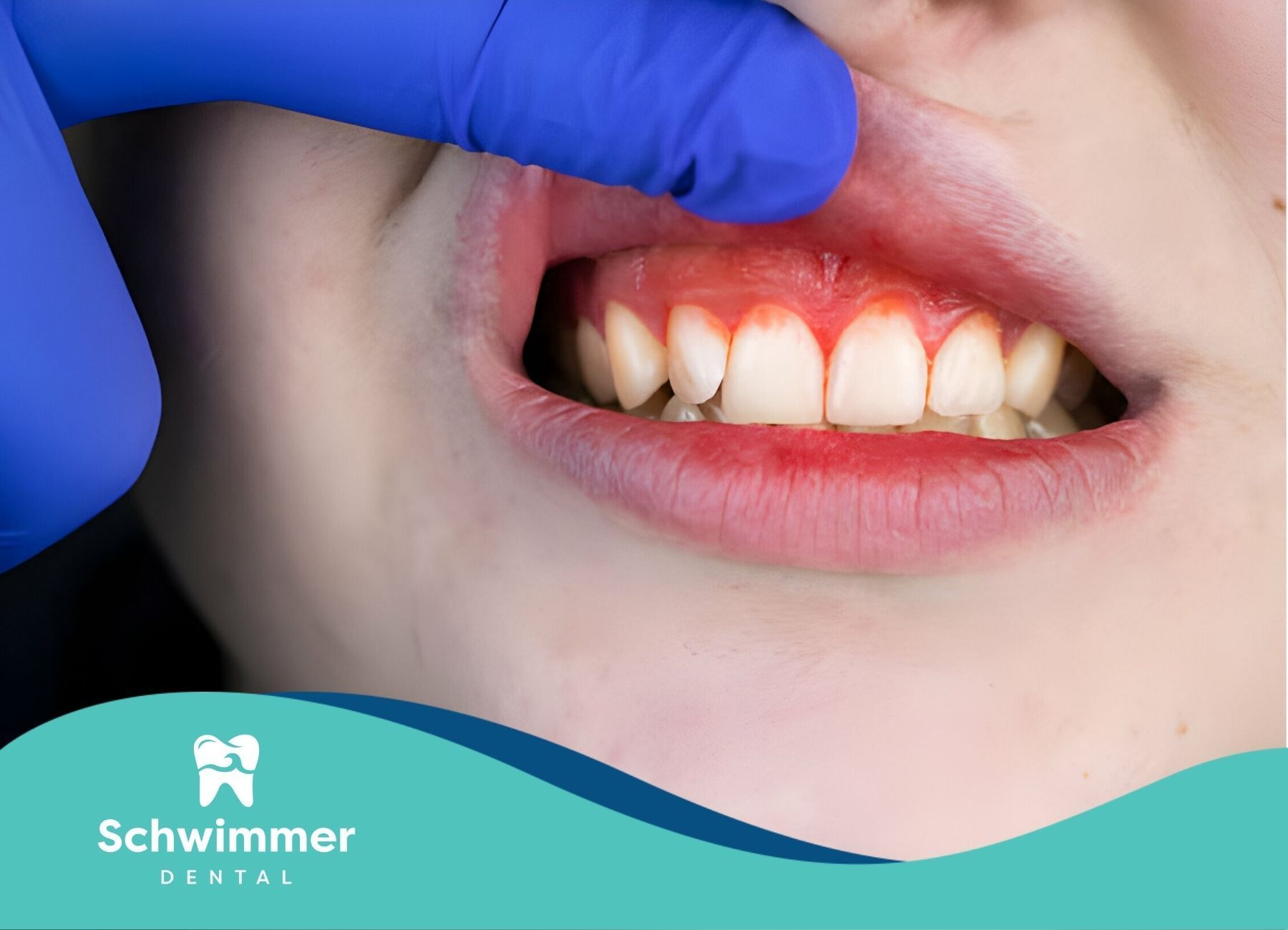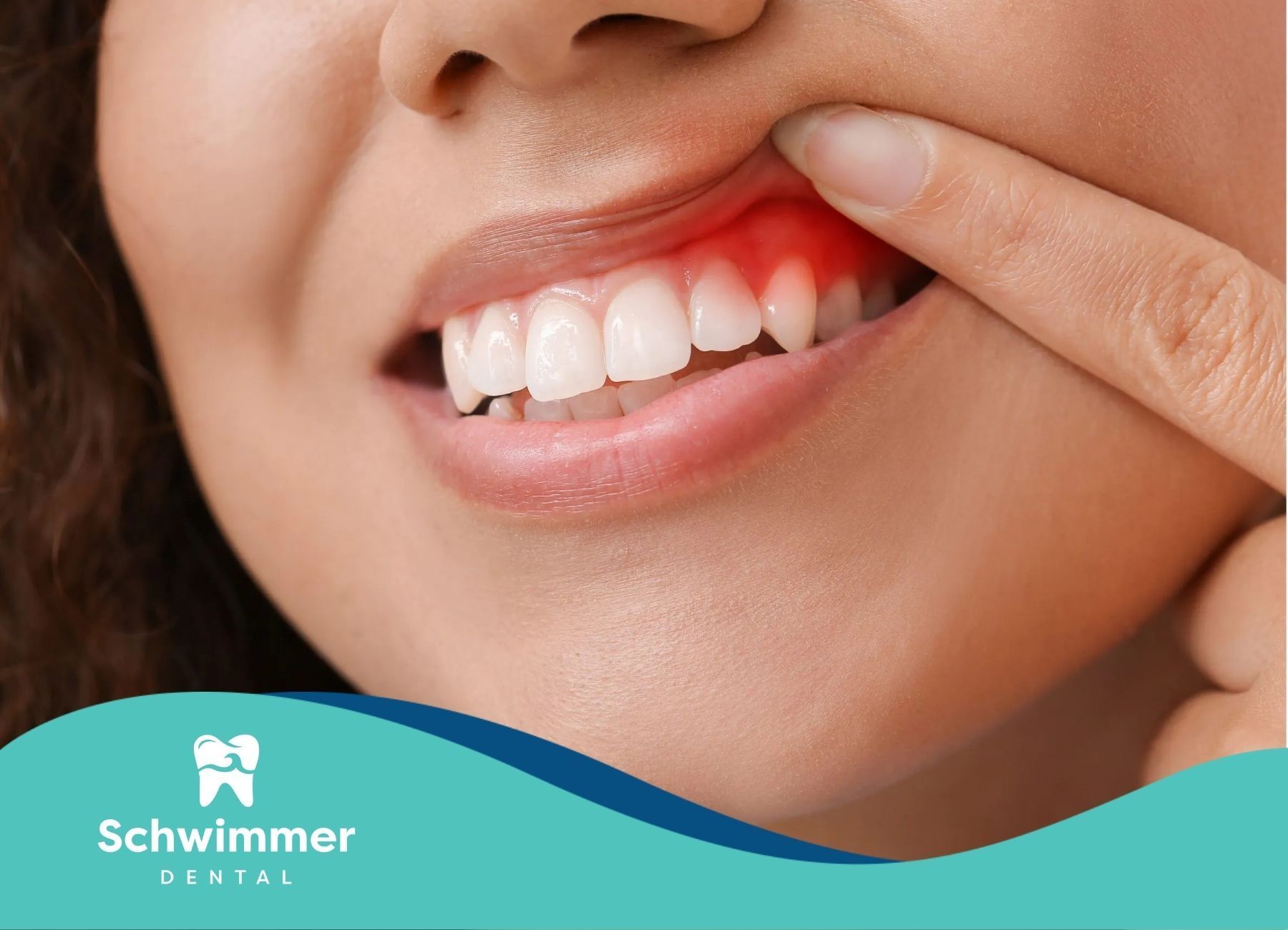Have an appointment? Complete the Intake Form
Is Gum Chewing Harmful to Your Dental Health?
Key Highlights
- While chewing gum can freshen breath and offer some oral health benefits, it's essential to choose wisely and practice moderation.
- Sugar-free gum can stimulate saliva production, helping to neutralize acids and wash away food particles that contribute to tooth decay.
- Always look for the ADA Seal of Acceptance, ensuring your gum has been rigorously tested and proven safe and effective for oral health.
- Chewing gum is not a substitute for brushing and flossing; it should complement a regular oral hygiene routine.
- Excessive gum chewing can lead to jaw pain, headaches, and potential damage to tooth enamel, especially for those with TMJ disorders.
- If you experience any discomfort or have pre-existing dental conditions, consult your dentist for personalized advice.
Introduction
Chewing gum is a common habit. Many people praise it for freshening breath and helping with cravings. But have you thought about how it affects your oral health? To know if chewing gum is good or bad for your teeth, you need to look into the different kinds of gum and how they affect your dental health. Let’s take a closer look at how chewing gum can shape your journey to better oral health.
Understanding Gum Chewing and Dental Health
Chewing gum makes your mouth produce more saliva. This is good because saliva helps protect your teeth from decay. It fights the acids that come from plaque bacteria. These acids can damage your tooth enamel and cause cavities. Sugarless gum is especially helpful. It increases saliva flow without adding sugar, which bad bacteria feed on.
But, you need to know the difference between sugar-free gum and sugary gum. Sugar-free gum helps your mouth stay clean, but sugary gum can harm your teeth. It can lead to tooth decay and make dental problems worse.
The Role of Gum in Oral Hygiene
Chewing gum makes more saliva, which helps wash away food bits stuck in your teeth and gums. This can keep your mouth cleaner and lower the chance of plaque and bacteria growing. These can cause cavities and gum disease.
Some sugar-free gums have xylitol in them. This natural sweetener can slow down the growth of a germ called Streptococcus mutans. This germ is mainly linked to tooth decay. Xylitol can help in reducing plaque and might even help to strengthen your tooth enamel.
So, chewing sugar-free gum after meals is a good extra step for your regular oral hygiene routine. It promotes saliva flow and helps get rid of food particles.
Common Myths vs. Facts about Chewing Gum
Many myths exist about chewing gum and how it affects oral health. Let's clear up some common ideas:
- Myth: All chewing gum is bad for your teeth.
- Fact: Sugar-free gum can actually help your oral health. It boosts saliva production and reduces acids.
- Myth: Chewing gum can erode tooth enamel.
- Fact: Chewing too much of anything can wear down enamel. However, chewing sugar-free gum in moderation is unlikely to cause serious harm.
- Myth: Chewing gum can replace brushing and flossing.
- Fact: Chewing gum should not replace brushing and flossing. It can help get rid of food particles, but it does not clean as well as traditional brushing or flossing does.
The Impact of Chewing Gum on Teeth and Gums
Chewing sugar-free gum can be good for your teeth. However, too much gum chewing can harm your oral health. One risk is jaw pain and problems with the temporomandibular joint (TMJ). This is especially true for people who already have these issues. Chewing gum too much can stress jaw muscles and make TMJ problems worse.
Another worry is that it may wear down tooth enamel, which can happen with too much chewing or with sugary gum. Tooth enamel is strong, but constant chewing can wear it down over time. This can lead to sensitivity and a higher chance of decay.
How Sugar-Free Gum Can Be Beneficial
Choosing sugarless gum has many benefits for your mouth. Chewing sugarless gum makes more saliva, which helps balance acids and wash away food bits. This saliva also gives your teeth important minerals like calcium and phosphate that help strengthen tooth enamel.
Some sugar-free gums have xylitol, a natural sweetener. Xylitol is good for oral health because it can slow down the growth of Streptococcus mutans. This bacteria is often linked to tooth decay, making xylitol a very tooth-friendly option.
When selecting sugar-free gum, look for the ADA Seal of Acceptance from the American Dental Association. This seal means the gum has passed tough tests and is safe for your oral health.
Risks Associated with Sugary Gums
Sugary gums may taste good, but they can harm your oral health. When you chew them, the sugar feeds the oral bacteria. These bacteria turn the sugar into acids. These acids can hurt tooth enamel, leading to tooth decay and cavities.
Some sugary gums are sticky. This stickiness lets them cling to your teeth for a long time. This means your enamel stays in contact with harmful acids longer, causing more wear and raising the chances of dental problems.
So, it's a good idea to stay away from sugary gums. Instead, choose sugar-free options. They can give you a fresh taste without risking your oral health.
Choosing the Right Gum for Your Dental Health
Choosing the right chewing gum can be confusing. There are many brands and flavors in stores. But selecting gum that helps your dental health is very important. Picking sugar-free gum instead of sugary types is a good first step.
Checking for the ADA seal on the packaging is wise. This seal shows that the gum has passed strict tests. It also means it meets the American Dental Association’s standards for helping your oral health.
Ingredients to Look For in a Healthy Gum
When examining the ingredient list of chewing gum, keep an eye out for the following:
Sweeteners:
- Xylitol: A natural sweetener that has been shown to inhibit the growth of cavity-causing bacteria and may even promote remineralization of tooth enamel.
- Artificial Sweeteners: While generally considered safe in moderation, some individuals may prefer to limit their intake of artificial sweeteners like aspartame, sucralose, or acesulfame potassium.
| Sweetener | Type | Potential Benefits |
|---|---|---|
| Xylitol | Natural | Inhibits cavity-causing bacteria, may remineralize enamel |
| Aspartame | Artificial | Provides a sweet taste without sugar |
| Sucralose | Artificial | Provides a sweet taste without sugar |
| Acesulfame K | Artificial | Provides a sweet taste without sugar |
Other Ingredients:
- Flavorings: Choose gums with natural flavorings whenever possible to avoid potential artificial additives.
The Importance of ADA Approval
The American Dental Association (ADA) has an important job. They check how safe and effective dental products are. If a product gets the ADA Seal of Acceptance, it has been tested carefully. It meets high standards for oral health benefits. When you see the ADA seal on chewing gum, you can trust that it helps your mouth, just like it says on the packaging.
The ADA looks at things like how well a product can reduce plaque acids, help tooth enamel, prevent cavities, and support gum health. Choosing ADA-approved chewing gum gives you extra confidence. You know you're making a good choice for your dental health.
By picking ADA-approved gum, you are taking part in your dental care. It helps you make smart decisions about what you use to keep your smile healthy.
Conclusion
Chewing gum can affect your dental health based on what type you pick. Choosing sugar-free gum can be good because it helps produce saliva and reduces bacteria. On the other hand, sugary gum can lead to tooth decay. When you choose gum, look for options with xylitol and check for ADA approval to help your oral care. Remember, gum is not a substitute for brushing and flossing. So, chew in moderation and keep up good oral hygiene for the best dental health. If you want more tips on improving your dental routine, talk to our experts today.
Frequently Asked Questions
Is sugar-free gum actually better for my teeth?
Yes, sugar-free gum is good for oral health. This is different from sugary gum, which can lead to cavities. Sugar-free gum helps increase saliva flow. More saliva can neutralize acids and make enamel stronger.
Can chewing gum replace brushing or flossing?
Chewing gum can boost saliva production and help get rid of some food particles. However, it should not take the place of brushing and flossing. Brushing and flossing are very important for taking away plaque and keeping your dental health good.
How often should I chew gum for dental benefits?
Chewing sugar-free gum for about 20 minutes after meals is usually enough to increase saliva flow and help with oral hygiene. Don't chew too much, as this can cause jaw pain or dental issues. People who have a dry mouth might find it helpful to chew gum more often.
SOURCES:
https://www.ada.org/resources/ada-library/oral-health-topics/chewing-gum
https://www.dentalhealth.org/sugar-free-chewing-gum
https://www.webmd.com/vitamins/ai/ingredientmono-996/xylitol
https://www.ada.org/resources/practice/dental-standards
https://www.healthline.com/nutrition/chewing-gum-good-or-bad
Need Assistance? We’re Here to Help
We are dedicated to enhancing your dental health and well-being.
We provide personalized dental care solutions for a confident, healthy smile.
Contact us today for Professional Dental Care.

Our caring staff will help you feel relaxed and comfortable in our state of the art office. We respect your time and pledge to deliver prompt service, backed by the latest knowledge, techniques, and technology.
Email: Office@schwimmerdental.com
Tel: (848) 294-2385
Fax: (732) 899-3347
Address: 1115 Arnold Ave,
Point Pleasant, NJ, 08742
Schwimmer Dental – Website by CWS


